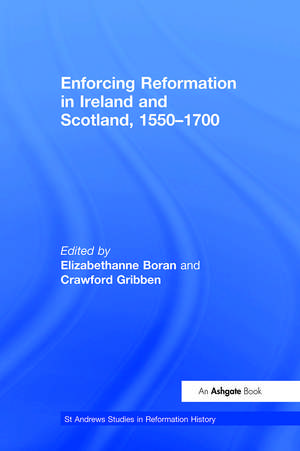Enforcing Reformation in Ireland and Scotland, 1550–1700
Autor Crawford Gribben Editat de Elizabethanne Boranen Limba Engleză Hardback – 26 mai 2006
Preț: 1054.71 lei
Preț vechi: 1286.24 lei
-18% Nou
Puncte Express: 1582
Preț estimativ în valută:
201.88€ • 219.36$ • 169.69£
201.88€ • 219.36$ • 169.69£
Carte tipărită la comandă
Livrare economică 21 aprilie-05 mai
Preluare comenzi: 021 569.72.76
Specificații
ISBN-13: 9780754655824
ISBN-10: 0754655822
Pagini: 272
Dimensiuni: 156 x 234 x 16 mm
Greutate: 0.45 kg
Ediția:1
Editura: Taylor & Francis
Colecția Routledge
Locul publicării:Oxford, United Kingdom
ISBN-10: 0754655822
Pagini: 272
Dimensiuni: 156 x 234 x 16 mm
Greutate: 0.45 kg
Ediția:1
Editura: Taylor & Francis
Colecția Routledge
Locul publicării:Oxford, United Kingdom
Notă biografică
Elizabethanne Boran is IRCHSS Fellow in the Department of History, Trinity College, Dublin, Ireland. Crawford Gribben Trinity College Dublin, Ireland
Recenzii
’This book is welcome because it takes the common theme of the enforcement of the reformation in the two countries and sets a range of different experiences alongside each other... This volume nicely underlines the complexities of policy-making and implementation for the early modern State and Church and is a good and fitting tribute to Professor Richard L Greaves whose scholarship ranged widely over the British Isles and the entire period under survey.’ Journal of Ecclesiastical History ’This is an excellent collection and raises a number of intriguing questions for further consideration.’ Sixteenth Century Journal ’High scholarly standards are apparent in all the essays, to which incisiveness, rigour and freshness are added in varying degrees....The volume not only holds value for those whose primary interests lie with one or other country, which it does, but will be of particular benefit in bringing important work on Ireland and on Scotland to bear on wider questions of Reformation, broadly understood.’ English Historical Review
Cuprins
Introduction, ElizabethanneBoran; Chapter 1 Sir Henry Sidney and the Reformation in Ireland, CiaranBrady, JamesMurray; Chapter 2 Printing in Early Seventeenth-Century Dublin, ElizabethanneBoran; Chapter 3 The Problem of ‘Scottish Puritanism’, 1590–1638, JohnCoffey; Chapter 4 ‘Force and Fear of Punishment’, AlanFord; Chapter 5 The Covenanters and the Scottish Parliament, 1639–51, John R.Young; Chapter 6 Robert Leighton, Edinburgh Theology and the Collapse of the Presbyterian Consensus, CrawfordGribben; Chapter 7 Godly Order, RaymondGillespie; Chapter 8 Enforcing the Reformation in Ireland, 1660–1704, TobyBarnard; Chapter 9 Conformity and Security in Scotland and Ireland, 1660–85, Richard L.Greaves;
Descriere
Adopting an international perspective, the essays in this volume look at the motives, methods and impact of enforcing the Protestant Reformation in Ireland and Scotland. The volume offers a fascinating insight into how the political authorities in Scotland and Ireland attempted, with varying degrees of success, to impose Protestantism on their countries. By comparing the two situations and placing them in the wider international picture, our understanding of European confessionalization is further enhanced.












